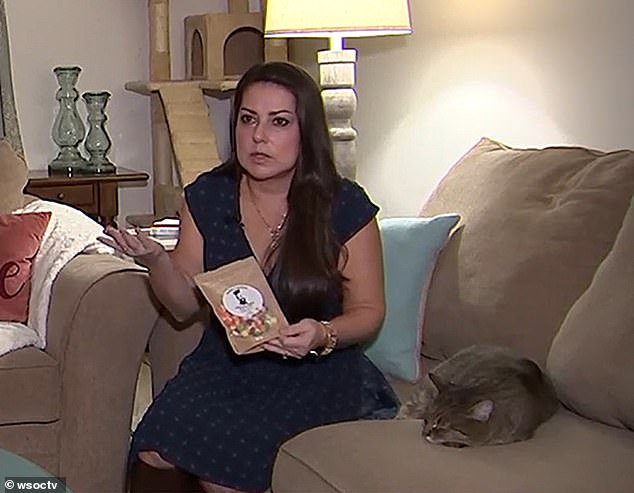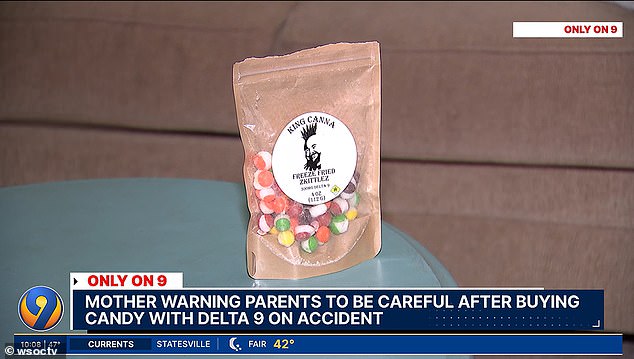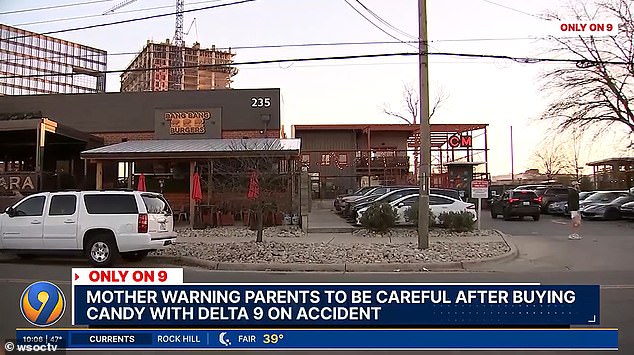FDA Warns Against Eating Five Imitation Candy That Could Kill You. See What’s Wrong?
They may seem like the familiar candies, cookies and chips that have become an indispensable part of most American households.
But these ‘imitation products’ contain psychoactive substances that can be fatal in high doses and are especially dangerous for children.
They contain delta-8 THC, a synthetic chemical that mimics the effects of marijuana and is sold in vape shops and grocery stores.
Today, the FDA and the Federal Trade Commission (FTC) sent warning letters to the sellers of five products, including Trips Ahoy! and Stoneos, claiming that the makers “completely disregarded consumer safety.”
Spikes in accidental cannabis overdoses have already been observed in people who accidentally ate edibles that looked like regular candy.
Above are the five products that the FDA is warning consumers not to eat. They look like popular candy, but are loaded with THC.

North Carolina mother Catherine Buttereit said her son became ill after accidentally eating 40 THC candies, mistaking them for Skittles.
Delta-8 THC can cause hallucinations, vomiting, unconsciousness, hospitalization, and in rare cases even death.
Because it takes more than an hour for the effects to be felt after ingestion, there is a high risk of overdose, experts say.
In January of this year, a six-year-old boy was hospitalized after eating 40 THC-containing gummies that his parents mistook for freeze-dried Skittles.
According to his mother, Catherine Buttereit of North Carolina, her son was in “excruciating pain” and spent hours in the hospital with a frozen chest, a burning head and a stomach that felt like it had knots in it from the “snacks.”
Namandje Bumpus, FDA’s deputy commissioner, said: ‘Inadequate or confusing labeling could lead children or unsuspecting adults to consume products… containing delta-8 THC without realizing it.
‘Since accidental ingestion and/or overconsumption of delta-8 THC products can pose significant health risks, the companies selling these illegal products show a complete lack of concern for consumer safety.’
She added: “The FDA will continue to work to protect the health and safety of American consumers by… taking action when companies sell products that pose a risk to public health.”
The companies behind the products are: Hippy Mood, Earthly Hemps, Shamrockshrooms.com, Mary Janes Bakery Co. LLC, Life Leaf Medical CBD Center, and GrowGod LLC.
Each company has 15 days to remove the products from sale or risk legal action from the authorities.

The image above shows the THC-infused candies the mother purchased, mistaking them for freeze-dried Skittles

And above is the store where she bought them, which didn’t even ask for her ID or warn her that the products contained THC.
A spokesperson for Earthly Hemps, which sold Dr. Blaze Slushers, said CNN They have not sold any of the products mentioned in the past year.
The others did not respond to requests for comment.
The warning comes after authorities issued a warning last year about six other products they said closely resembled popular sweets.
Authorities are very concerned about counterfeit food products containing THC. They fear that people could accidentally overdose on it, with all the possible harmful effects that entails.
The products are also often easy to obtain and quick to order.available to young people — with packaging that is nearly indistinguishable from many popular snack foods.
At least one child has died after overdosing on delta-8 THC edibles.
In the two years ending in 2022, National Poison Control Centers reported 10,448 adverse reactions resulting from eating edibles containing THC.
Of these cases, 77 percent involved persons aged 19 years or younger and 65 percent were the result of unintentional exposure.
Of those who unknowingly ate the products, 91 percent were children.
Samuel Levine, director of the FTC’s Bureau of Consumer Protection, said: “Companies that market and sell THC edibles that could easily be mistaken for snack foods and candy are not only acting illegally, they are also endangering the health of young children.
“Those who put profit before the safety of children are at high risk of legal action.”
In the case of the Buttereit family, the boy’s mother said they were duckpin bowling in Charlotte’s South End when her son asked for the snacks.
He asked about it, sold in a package labeled “Freeze Fried Zkittlez,” and said he had never seen freeze-dried Skittles before and was eager to try them.
“I said, ‘Sure, yeah, that looks cool. Let’s try it.’ And he handed me the bag and I handed it to the cashier, she punched it in and we completed the transaction,” the mother said. The New York Post.
“I was never asked for any ID. I was never informed about what I was buying.”
He started showing symptoms after eating the sweets, but Mrs Buttereit only called emergency services after he told her his water tasted “disgusting”, a warning sign she had once heard of poisoning.
Then the family read the back of the candy packaging and saw that it contained THC.
